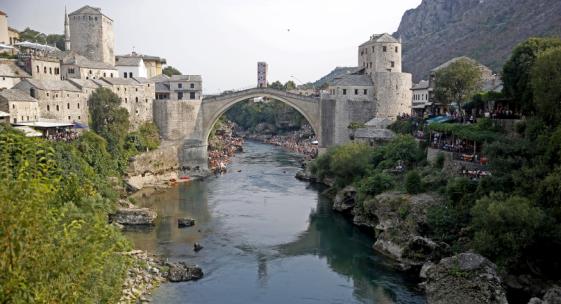
The reconstructed Old Bridge in Mostar, Bosnia and Herzegovina. The new IMF loan should help spur the completion of yet unfinished reforms (photo: Dado Ruvic/Reuters/Newscom)
Bosnia and Herzegovina: Turning the Economy Around
September 9, 2016
- New three-year, $608 million IMF loan to help government implement ambitious reforms
- Main goals: private sector growth, higher public investment, financial sector reform
- Program promotes unified economy in highly decentralized country
Related Links
While the economy of Bosnia and Herzegovina has continued to recover from the global crisis to reach a GDP growth rate above 3 percent in 2015, and its budget was close to balance in 2015, the country is still lagging behind its regional peers in catching up with Western Europe.
Despite the recent recovery, per capita income remains only one quarter of that in the countries of the European Union. An oversized public sector, with one of the highest levels of public employment in Eastern Europe, has elbowed out productive public infrastructure spending. The country has found it difficult to obtain financing from international markets.
With structural reforms left unfinished, the private sector has struggled to drive economic growth. Private investment is low and foreign investors have generally stayed away. As a consequence, unemployment is running high—youth unemployment rate exceeds 62 percent. Not surprisingly, a large number of educated young people have left for Western Europe over the past two decades, further affecting the potential for future growth.
Policymaking is difficult in the heavily decentralized country, which comprises the Institutions of Bosnia and Herzegovina, two main entities, 10 cantons, and an independent district. This administrative structure, put in place following the Dayton Peace Accords, has made preserving a single economic space an ongoing challenge.
Reform agenda
In early 2015, the incoming governments adopted a reform agenda with plans for economic and social reforms, strengthening the rule of law, tackling corruption, and improving public institutions. The plan has the full support of the European Union, the IMF, and the World Bank as well as bilateral donors.
“The Reform Agenda is a welcome development, but successful implementation would depend on tackling entrenched interest groups that often operate along ethnic lines. It would also require improved coordination and cooperation among governments within the decentralized administrative structure. The new IMF program helps carrying out the much-needed structural reforms and contains measures to strengthen the single economic space,” said Nadeem Ilahi, the IMF’s mission chief for Bosnia and Herzegovina.
Overhaul state ownership, make economy nimble
The government economic program supported by the IMF has three main objectives.
First, enhance the business environment to attract investment, create private sector jobs, and raise the economy’s growth potential by
-
carrying out the recently approved labor market reforms to make the labor market more flexible;
-
boosting the economy’s potential by restructuring or selling large and often inefficient state-owned enterprises; and
-
lowering the distortive tax on formal sector employment—the labor tax wedge—and reducing intra-country fragmentation by harmonizing tax laws among entities.
Second, improve the quality of government spending and make it pro-growth by
-
lowering public employment and the public wage bill, and allowing the private sector to become an important player in the labor market;
-
improving tax collection through better coordination among the tax authorities;
-
spending more on infrastructure, health care, education, and investment;
-
more focused targeting of social spending, including through pension reform; and
-
introducing fiscal and financial discipline in lower levels of government and state owned enterprises.
Third, safeguard financial stability and revive bank lending by
-
preserving central bank independence and the currency board arrangement, which provides a fixed exchange rate anchor to policies;
-
tackling vulnerable banks and improving the nonperforming loan recovery and resolution framework to revive bank lending;
-
harmonizing banking legislations across the two entities;
-
enhancing coordination and cooperation among the bank supervisory and regulatory agencies; and
-
lowering the fiscal risks from the operations of public development banks.
The IMF program, approved on September 7, 2016, enables further financial assistance from the World Bank, the European Union, and other international partners to help Bosnia and Herzegovina turn around its economy.


